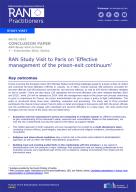Details
- Publication date
- 16 February 2022
- Author
- Directorate-General for Migration and Home Affairs
- RAN Publications Topic
- Prison and probation
Description
France is among the European Union (EU) Member States confronting challenges posed by a large number of violent and extremist terrorist offenders (VETOs) in custody. As of 2021, records showed 450 prisoners convicted for terrorist offences and 640 prisoners convicted for non-terrorist offences, as well as 670 former offenders released on bail or parole.
There are also about 120 radicalised and terrorist offenders who were released between 2019 and 2021, while 130 will be released by 2024. With the management needs of the prison-exit process continuing to grow in importance for France, the prison administration has put in place a policy to fight radicalisation.
The policy is structured along three axes: detecting, evaluation and preventing. The study visit to Paris provided participants the chance to learn about France’s policy in detail and engage in discussions with both the prison officials and the practitioners who engage with radicalised and terrorist offenders on a daily basis.
The main points that emerged over the course of the study visit are listed below.
- Evaluation and risk assessment in prison are conducted in a holistic manner by different professionals, to gain understanding of the individual’s needs, resources and vulnerabilities. Based on this assessment, not only the risk is determined, but also the nature of the follow-up support needed.
- This holistic approach to both evaluation and care management is provided by a multi-disciplinary team, consisting of prison officers, psychologists, educators and cultural and religious mediators, including external consultants.
- Religious and intercultural mediation play a central role in the prison and probation’s deradicalisation approach, as well as within the PAIRS resocialisation programme.
- Building trust and creating authenticity in the relationship with the inmates is a key aspect in deradicalisation work but presents a major challenge. Risk assessment tools are helping professionals in the evaluation process, but a significant part of the work is related to creating trust between the inmate and the intervention team.
- Civil society organisations providing deradicalisation support outside prison, particularly after release (such as the PAIRS programme), are considered partners and a complementary service to the prison and probation efforts, working towards the same goal.
- Gender-sensitive approaches are necessary when extending the existing offer to detained women, acknowledging their specific needs. Addressing the role of parenthood for both mothers and fathers in custody is crucial.
This paper summarises the main insights gained about the French policy on effectively managing the prison-exit continuum. It presents the approach in detail, highlighting inspiring practice as well as gaps and challenges that emerged during discussions. Finally, recommendations and further reading are presented.

